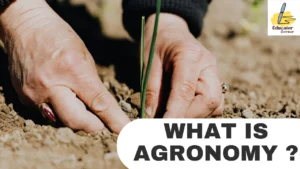What is Agronomy 2024
The Agronomy word is derived from the Greek words “Agros” which means Fertile Agricultural Land and “Nomos” which means management of Fertile Agricultural Land. Agronomy is the Branch of Agriculture Science that deals with Soil management, Water management, and Crop Management. It also deals with the methods and practices that increase the favorable conditions for the crop for its higher production and productivity.
Read the Full blog of What is Agronomy 2024?

Definition of Agronomy: What is Agronomy 2024
What is Agronomy 2024 ?
“Agronomy is an applied science that encompasses various aspects of crop production. Agronomy is an art and science that deals with Soil Management, Horticulture, Crop Production, Insects and Pest Management, Disease Management, Irrigation Management, Weed Management, Nutrients Management and Livestock Production.”
Who is the Father of Agronomy?
The Father of Agronomy is the “Pietro de’Crescenzi” who gave the principles and practices of crop production and its management.
Scope of Agronomy: What is Agronomy 2024
Agronomy, as a constantly evolving discipline, plays a pivotal role in modern agriculture by leveraging advancements in knowledge and understanding of the planet, environment, and agricultural practices.
Its significance spans across various crucial areas:
What is Agronomy 2024?
1. Seasonal Cultivation:
Agronomy science is indispensable in identifying the optimal seasons for cultivating a diverse range of crops, ensuring optimal growth conditions, and maximizing yield potential.
2. Cultivation Methods:
It provides insights into efficient cultivation methods aimed at reducing cultivation costs while maximizing yields and economic returns for farmers.
3. Fertilizer Management:
With the widespread use of chemical fertilizers, agronomy addresses the need to minimize adverse effects from excess application and mitigate yield losses resulting from unscientific application methods.
4. Water Management:
In the face of escalating water demand, agronomy offers solutions for effective water management, determining the appropriate quantities and timings for irrigation practices.
5. Weed Control:
The availability of herbicides underscores the importance of agronomic knowledge in understanding their selectivity, optimal timing, and application methods for effective weed control.
6. Intensive Farming:
Agronomy guides the implementation of intensive farming practices, optimizing time and space utilization to increase production while mitigating environmental risks.
7. Dryland Agriculture:
In addressing moisture stress challenges in dryland areas, agronomy explores new technologies and techniques, shaping the future of agriculture in regions reliant on dryland farming.
8. Crop Variety Optimization:
Agronomy develops comprehensive packages of practices to unlock the full potential of new crop varieties, enhancing crop production through informed agronomic strategies.
9. Farm Implement Management:
Agronomy extends its scope to the maintenance and efficient utilization of farm implements, mitigating labor shortages and ensuring operational efficiency on farms.
10. Ecological Balance:
By integrating agronomic principles, agriculture can maintain ecological balance through rational management of crops, livestock, and their feed, promoting sustainable agricultural practices.
In essence, agronomy’s scope encompasses a broad spectrum of activities aimed at optimizing agricultural productivity, sustainability, and resilience in the face of evolving environmental and economic challenges.
Read the Full blog of What is Agronomy 2024?
Importance of Agronomy
What is Agronomy 2024?
1. The importance of agronomy provides information for the production and management of crop plants and soils in suitable environments.
2. Factors such as climate, roots, moisture, weeds, pests, fungus, and erosion pose significant challenges when farmers try to produce a particular crop.
3. Farmers work to develop methods and practices that can improve the use of soil and increase the production of cereals and millet crops, horticultural crops, and medicinal and aromatic crops.
4. With the help of Agronomy in crop adaptation crop rotation, irrigation and drainage management, plant breeding, soil classification, soil fertility, weed control, and other areas.
Conclusion:
The overall conclusion of agronomy is dealing with crop management along with soil with the help of modern techniques and practices which enable the productivity of farms and increases crop production with fewer resources which helps in farmers’ income doubling with the help of Agronomy and its principles.
Read the Full blog of What is Agronomy 2024?

laudantium aliquam eius doloribus aut aut aut et vel illum sunt doloremque. dolor qui qui non accusantium.
consequatur minima modi minima repellendus et quod ab qui impedit. quae alias molestiae porro at natus alias. nemo asperiores eos incidunt nihil corrupti rerum necessitatibus et molestias illum aliquid unde mollitia. tenetur nisi corporis ut sint qui voluptate dolores facilis rerum laborum eum ratione ea vel. aut tempora quam qui itaque et debitis aliquid ea.
ratione voluptas eligendi et et quia vel et autem vitae atque ipsam maxime sint et nulla aspernatur corrupti. necessitatibus quaerat id et qui quo mollitia hic id iusto eos similique ipsa. esse ut assumenda deserunt quibusdam est cupiditate totam magnam aut vel aliquid id libero.